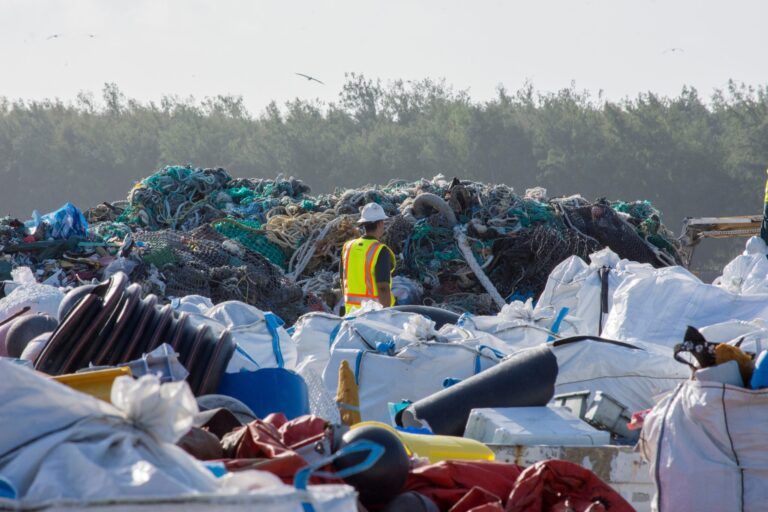(San Francisco) – Countries meeting this week to negotiate a global plastics treaty should agree to a legally binding instrument that fully respects human rights and protects the climate by setting a cap on plastic production, Climate Rights International said today. The fifth and final negotiating session (INC-5) will be held November 25 to December 1 in Busan, South Korea.
Plastics inherently pose a threat to human rights. They are made of chemical additives that are toxic to humans, pollute waterways, and harm wildlife. More than 99 percent of plastics are made of fossil fuels, which are driving the climate crisis, the greatest threat to human rights around the world.
“For the Global Plastics Treaty to effectively protect people and the planet, countries must agree to cap plastic production, limit the use of harmful chemicals in plastics, and make plastic producers pay for harms,” said Krista Shennum, researcher at Climate Rights International. “Just as you can’t put out a fire while continuing to add fuel, we can’t address the plastics crisis while allowing limitless plastic production. A cap on plastic production is a necessity for a rights-respecting plastics treaty.”
The absence of any global framework to combat the plastics crisis has created an environment where rich, developed countries export their plastic waste to countries in the Global South, major fossil fuel companies promote disinformation about plastic recycling in order to support the business of producing new plastics, and plastic particles can now be found almost everywhere on Earth. Microplastics have been found in human breast milk, in almost all tap water, suspended in the air on remote mountain tops, and even in the Mariana Trench.
Until recently, there have been no joint, global efforts to combat the harms of plastic production, use, and disposal on human rights or the environment. The current draft text has some promising language that could effectively reduce the impacts of plastic on human rights and the environment. For example, while the language related to the supply of primary plastic polymers is yet to be finalized, some options in the draft would require countries to take measures, “for the purpose of preventing and mitigating impacts on the environment,” while some weaker language would only encourage action.
“Voluntary commitments without any enforcement mechanisms will not be sufficient to protect rights,” said Shennum.
There is consensus from human rights experts that a legally binding Global Plastics Treaty that includes a cap on production is key for advancing human rights. An open letter from the UN High Commissioner for Human Rights, Volker Türk, states, “To end plastic pollution, we need pollution prevention, with reduction targets for plastic polymer production, and the promotion of toxic-free upstream solutions like reuse that reduce supply and demand for plastics.” Meanwhile, a joint statement from UN human rights experts on toxics, climate change, the environment, and business calls for the phase-out of non-essential plastic products and increased accountability for plastic producers by establishing a global fund based on the polluter-pays principle.
Yet key roadblocks stand in the way of a treaty that addresses plastics’ lifecycle impacts. At the fourth negotiating session in April, there were more fossil fuel and chemical industry lobbyists than national delegations, scientists, and Indigenous Peoples. With global subsidies for plastic production estimated at US$45 billion in 2024, major plastics and petrochemical producing companies and their lobbyists are likely to advocate against measures that challenge their business-as-usual, despite the current and future harms of plastics on people and the planet.
Last week, it was reported that the United States government has walked back its previous support for a cap on plastic production. The U.S. is one of the world’s largest plastic producers, and communities living along the Gulf Coast or “Cancer Alley,” home to many petrochemical facilities, face elevated rates of cancer, respiratory diseases, and other health impacts.
Country negotiators should follow the expertise of scientists, Indigenous Peoples, waste pickers, civil society groups, and people at the frontlines of the plastics crisis by finalizing a treaty that protects human rights and the climate, Climate Rights International said.
“Negotiations on a Global Plastics Treaty provides a moment of hope and opportunity. The Biden administration should see this as an opportunity to leave a powerful legacy in favor of public health and climate action, particularly since the U.S. is very unlikely to sign the Global Plastics Treaty under the Trump administration,” said Shennum. “We urge all countries, including members of the High Ambition Coalition, to push for the treaty to be adopted by majority, not consensus, so that a few low ambition countries do not prevent much needed action.”
Photo Credit: U.S. Fish and Wildlife Service (CC0).







